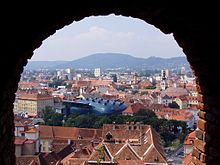Kunsthaus Graz


The Kunsthaus Graz, Grazer Kunsthaus, or Graz Art Museum was built as part of the European Capital of Culture celebrations in 2003 and has since become an architectural landmark in Graz, Austria. Its exhibition program specializes in contemporary art from the 1960s onwards.[1]
Architecture
[edit]Kunsthaus Graz was designed by Colin Fournier and Sir Peter Cook. According to The Bartlett School of Architecture at University College London, the Kunsthaus' design sought to be deliberately provocative, innovate museum design by offering a less "institutional" approach to organising exhibition spaces and employs new materials and manufacturing techniques.[2] The building is an example of blob architecture, and has a skin made of iridescent blue acrylic panels that also double as photovoltaic panels.[3] Owing to its shape contrasting with its surroundings,[4] it is known in local vernacular as the "Friendly Alien".[3] or rather as the black tumor.[citation needed]
The building incorporates the façade of the Eisernes Haus, an iron-framed structure built in 1848.[5]
Concept
[edit]Architecture, design, new media, internet art, film, and photography are united under one roof. Kunsthaus Graz was developed as an institution to stage international exhibitions of multidisciplinary, modern and contemporary art from the 1960s to the present day.[1] It does not collect art, maintains no permanent exhibitions and does not have its own depot.[6] Rather, its exclusive purpose is to present and procure contemporary art productions.[4]
As founding director, Peter Pakesch was responsible for the orientation and the program of the Kunsthaus between the administration in 2003 and the end of his directorship at the Universalmuseum Joanneum.[7]
BIX façade
[edit]
The BIX façade of the museum represents a singular fusion from architecture and New Media and is based on a concept of the Berliner architects realities:united.[8] BIX, a name which consists of the words "Big" and "pixels", is the acrylic glass skin of the eastern side of the building, which consists of 930 fluorescent lamps whose brightness can be individually adjusted. Variable at 20 frames per second, the façade can be used as a large screen for films and animations in what is referred to as a "communicative display skin".[8]
The BIX façade concept was entered into the permanent Architecture and Design Collection of the Museum of Modern Art (MoMA) in New York in 2011.[9]
Other
[edit]On 1 May 2011, the Austrian Postal Service released a postage stamp commemorating the object as part of the Kunsthäuser permanent stamp series.[10]
To mark the tenth anniversary of the Kunsthaus, Ingo J. Biermann, Fiene Scharp and Kai Miedendorp made a short half-documentary film in and about the building. The film Astronaut's Ark was conceived for the Kultur:Stadt exhibition, which took place from March to June 2013 at the Akademie der Künste (Berlin) and from July to October 2013 at the Kunsthaus Graz.[11]
Literature
[edit]- Cook, Peter & Fournier, Colin. A Friendly Alien: Ein Kunsthaus fur Graz. Hatje Cantz Publishers. September 30, 2004. ISBN 3-7757-1350-6
References
[edit]- ^ a b Hoover, Kristin (6 May 2013). "Kunsthaus Graz | Peter Cook and Colin Fournier". Arch2O.com. Retrieved 20 December 2018.
- ^ UCL (6 December 2016). "Kunsthaus Graz". The Bartlett School of Architecture. Retrieved 20 December 2018.
- ^ a b "Austria's Blob-Shaped Kunsthaus Graz Art Museum Generates its Own Solar Power". Retrieved 20 December 2018.
- ^ a b Spring, Martin; Spring 2003-10-10T00:00:00+01:00, Martin. "Kunsthaus Graz: You sexy thing". Building. Retrieved 20 December 2018.
{{cite web}}: CS1 maint: numeric names: authors list (link) - ^ "Kunsthaus Graz: Architecture" Universalmuseum Joanneum. Retrieved 11 May 2022.
- ^ Christof, Karin. "Kunsthaus Graz. The convention of an alien object". Volume. Retrieved 20 December 2018.
- ^ "Pakesch Peter - Sommerakademie at Zentrum Paul Klee". www.sommerakademie.zpk.org. Retrieved 20 January 2021.
- ^ a b Arcspace. "Kunsthaus Graz". arcspace.com. Retrieved 20 December 2018.
- ^ "BIX Light and Media Façade Added to Moma's Permanent Collection". archlighting.com. Retrieved 20 December 2018.
- ^ "Kunsthaus Graz | 2011 | Briefmarken | Kunst und Kultur im Austria-Forum". austria-forum.org. Retrieved 2 January 2021.
- ^ "BUILDINGS TELL STORIES | Akademie der Künste, Berlin". adk.de. Retrieved 2 January 2021.
External links
[edit]- Kunsthaus Graz
- (in German) The geometry of the Kunsthaus Graz
- (in German) BIX Medienfassade
- Art museums and galleries in Austria
- Buildings and structures completed in 2003
- Architecture in Austria
- Postmodern architecture
- Expressionist architecture
- Buildings and structures in Graz
- Museums in Graz
- Art museums and galleries established in 2003
- 2003 establishments in Austria
- Tourist attractions in Graz
- 21st-century architecture in Austria
